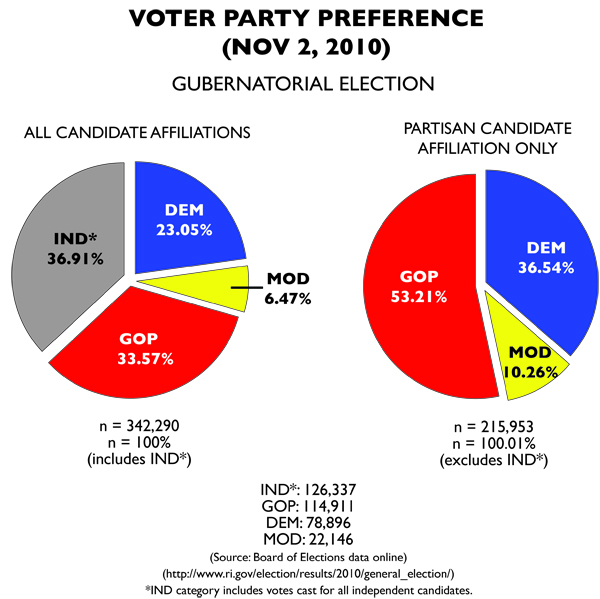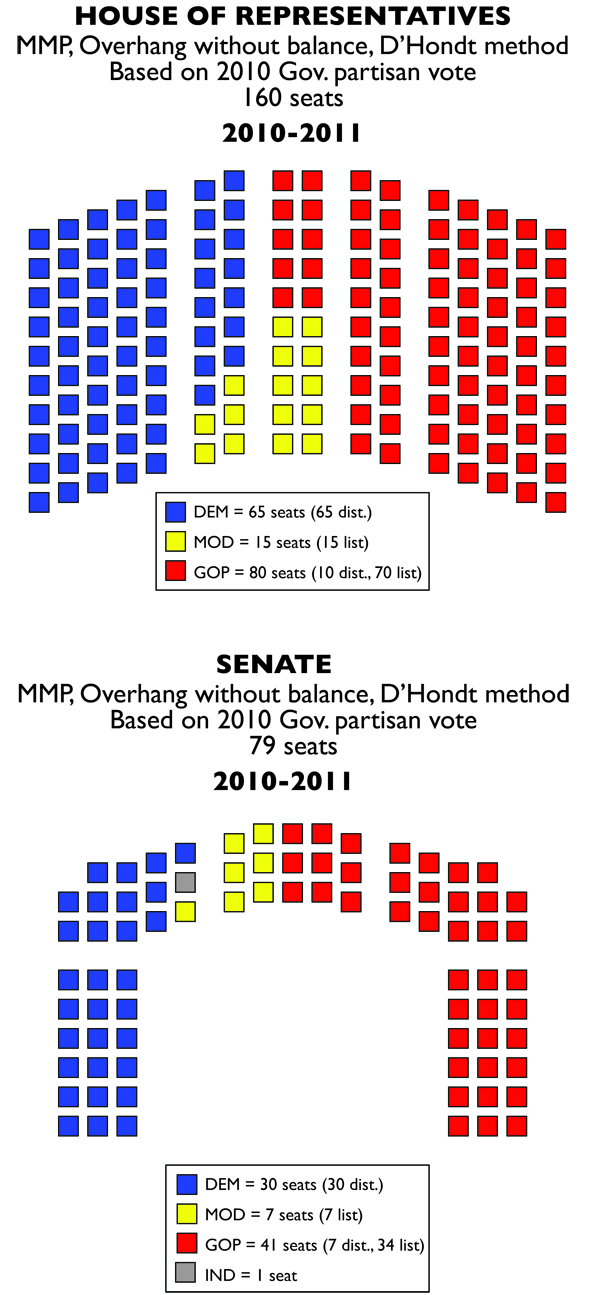The reason I’m focusing on these races is because they might give us an idea about what an MMP election might look like in Rhode Island with a party list vote. If you’ll remember, when MMP elections don’t rely on district results, there’s a separate ballot question asking what party a voter prefers. It’s like a statewide election for party, with the effect that it’ll change the party proportions in the chambers.
Let’s look at the gubernatorial election.
2010 MMP Election Using Gubernatorial Results

I like to think of this as the worst-case scenario for Democrats. First, I’ve removed all the independent voters, simply because it’s hard to simply declare they’d go to the Democratic Party. This means we’re looking solely at the votes that the Democrats, Republicans, and Moderates received. And there weren’t that many for Democrats.
Once again, the districts favor the Democrats. They win handily there, 65 seats in the House and 30 seats in the Senate. However, they have a terribly weak performance in the party list vote. In our alternate history version, we might speculate that in 2010 the depressed turnout of Democratic voters combined with Republican enthusiasm to increase the percentage of Republican votes.
The results in the districts allow Democrats to retain power disproportionate to what the D’Hondt method gives them. The D’Hondt method awards 55 seats to the Democrats in the House, but they win 65 in the districts. That means no one from their list makes it into the House. Republicans have a different result, with 7 out of 8 of their representatives from the list.
Both chambers result in overhang thanks to institutional Democratic advantage and the presence of Sen. O’Neill. What this leaves us with is a House with a Republican plurality (exactly 50%) and a Senate with a slight Republican majority. It’s impossible for either of the two biggest parties to form a veto-proof majority without being joined by many members of other parties. In the House, at least, there needs to be a coalition leadership team. It’s either a Republican-Moderate coalition which fails to give a veto-proof supermajority, or it’s a Grand Coalition between Democrats and Republicans. So it’s probably going to be the former, but the longer MMP lasts, the more likely the latter might get (difficult as it is to imagine now).
In many ways, this is not a good position for the Moderates (despite the fact they’re in the General Assembly). Being a junior member of a coalition is a troubling position to be in, especially when much of the Moderate brand is attempting to say that they’re not Republicans (witness the Liberal Democrats in the UK). On the other hand, should they refuse to sign a coalition agreement in the House, it’ll be easy to portray them as being responsible for that chamber’s instability.
And instability ultimately seems likely to happen. With slim majority control in one chamber and a coalition in the other, Republicans would be forced to find the broad consensus in their decision-making very quickly. It’s a lot easier to whip 10 representatives than to whip 80, and Republicans have never had to whip a majority of a chamber to pass legislation since they last were in power. They’d have to learn fast.
Part of what makes the Democratic Party so effective in its control of the General Assembly is that it usually knows how to shunt aside irrepressible dissenters and how to bring along just enough people to have a large majority. This is what made the failure of the pension amendment to the budget such a surprise. The Democratic leadership doesn’t get blindsided, they blindside others.
Those effective masters of parliamentary maneuver don’t disappear either. They’d be out there causing trouble for Republicans. And with so many new legislators in their caucuses, Republicans would have a hard time keeping any dissenters from breaking ranks.

This is Part 11 of the MMP RI series, which posits what Rhode Island’s political landscape would look like if we had switched to a mixed-member proportional representation (MMP) system in 2002. Part 10 (a discussion of limitations) is available here. Part 12 is another look at the Election of 2010 using the Attorney General results.
]]>